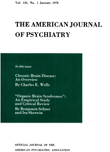Importance of schizophrenic symptoms in the diagnosis of mania
Abstract
The authors examined a sample of 111 consecutively admitted patients who satisfied inclusion criteria for mania and further characterized them as exhibiting none, one, or two or more of five clinical features often believed to be associated with a diagnosis of schizophrenia: formal thought disorder, first-rank symptoms, auditory hallucinations, persecutory delusions, and catatonia. The presence and number of such symptoms were unrelated to any of the major demographic, clinical, historical, laboratory, or familial variables studied. The authors conclude that schizophrenic symptoms do not play an important role in patients who satisfy modern criteria for the diagnosis of mania.
Access content
To read the fulltext, please use one of the options below to sign in or purchase access.- Personal login
- Institutional Login
- Sign in via OpenAthens
- Register for access
-
Please login/register if you wish to pair your device and check access availability.
Not a subscriber?
PsychiatryOnline subscription options offer access to the DSM-5 library, books, journals, CME, and patient resources. This all-in-one virtual library provides psychiatrists and mental health professionals with key resources for diagnosis, treatment, research, and professional development.
Need more help? PsychiatryOnline Customer Service may be reached by emailing [email protected] or by calling 800-368-5777 (in the U.S.) or 703-907-7322 (outside the U.S.).



